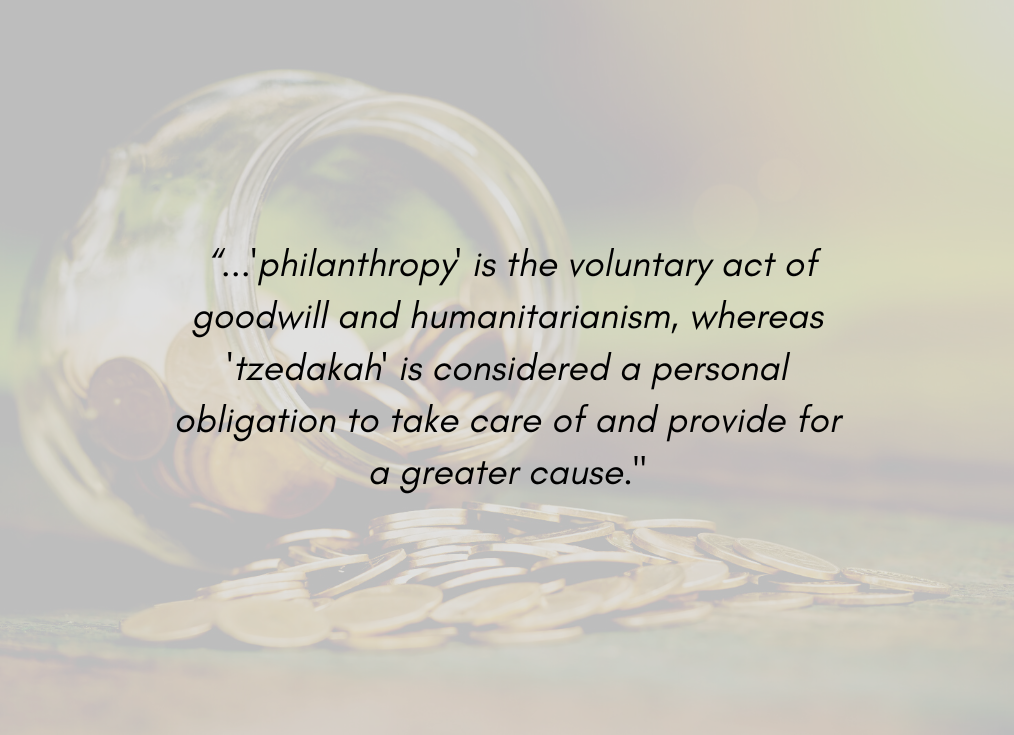Tzedakah vs Philanthropy

February 24, 2023
Ten years ago, on February 15, 2013, while still in the Jewish day school world, I penned a version of the following dvar Torah. Although my role today has changed from looking at the text through a broader lens of Jewish community versus the more particular lens of Jewish family that I used back then, there is little doubt that the lessons to be learned are universal.
This week’s Torah portion leads with the verse, “…you shall accept gifts for Me from every person whose heart so moves them” (Exodus 25:2), expressing Gd’s direction to Moses to accept all the Israelites’ donations toward the building of the mishkan (“tabernacle”) in the desert. What a strange and random request at this stage of the Israelites’ Exodus. Moses finds himself in the peculiar circumstance of needing to ask a nation of recently freed slaves to donate the only material possessions they own while they wander in the desert!
Even more coincidental is that the Israelites possess such items as precious metals – gold, silver, and copper; textiles – linen, red wool, blue wool, and purple wool; animal skins like goat fleece and ram skins; and Cedar wood, olive oil, and precious stones; all of which not too long ago belonged to their Egyptian slave owners.
…
What we do know is that although this “fundraiser” came at a precarious time and asked for 100% participation “from every person whose heart so moves” them. What the people came to understand, however, was that the act of giving was what demonstrated their freedom. It was the giving that they could not do as slaves and the inability to give freely that defined their slavery. Now they could give, and they could give lots, and they could give freely, and they could give to the worthiest of causes.
Philanthropy and tzedakah are not the same according to our Jewish tradition. Although they are used interchangeably, “philanthropy” is the voluntary act of goodwill and humanitarianism, whereas “tzedakah” is considered a personal obligation to take care of and provide for a greater cause.
Some sages consider this “request” by Gd to be the Israelites’ first test as a free nation. Were they still mental and emotional slaves who were unable to act of their own accord? Or were they now truly a free nation able to give of themselves and their belongings for this bigger mission? This was Gd asking for their new possessions to provide for the building of Gd’s “home” on earth. Who was going to step up to the plate?
Ironically, looking back at Exodus 12:35, the verb used when the Israelites departed Egypt and took possession of the Egyptian wealth was yishalu (ישאלו), literally translated as “borrowed.” In hindsight, the Torah foreshadowed that this wealth was not for the people’s personal possession; rather, they were “borrowing” it on behalf of Gd to be used for a greater cause down the road.
This weekend, ask your child, your friend, your neighbor, and even yourself, what does it mean to “help” others and “give” of yourself. Do you need to be asked to do it, or do you do it freely? Tzedakah comes in many shapes and sizes, and any child of any age can find a way to fulfill this essential mitzvah. Research clearly shows that the child who understands the “obligation of charity” is one who is more empathic and likely to relate better to others in adulthood. Empathy comes from putting oneself in another’s proverbial “shoes.” Tzedakah comes from knowing that it is incumbent upon us to help those in need. Because we are…
STRONGER TOGETHER.
Shabbat Shalom,

